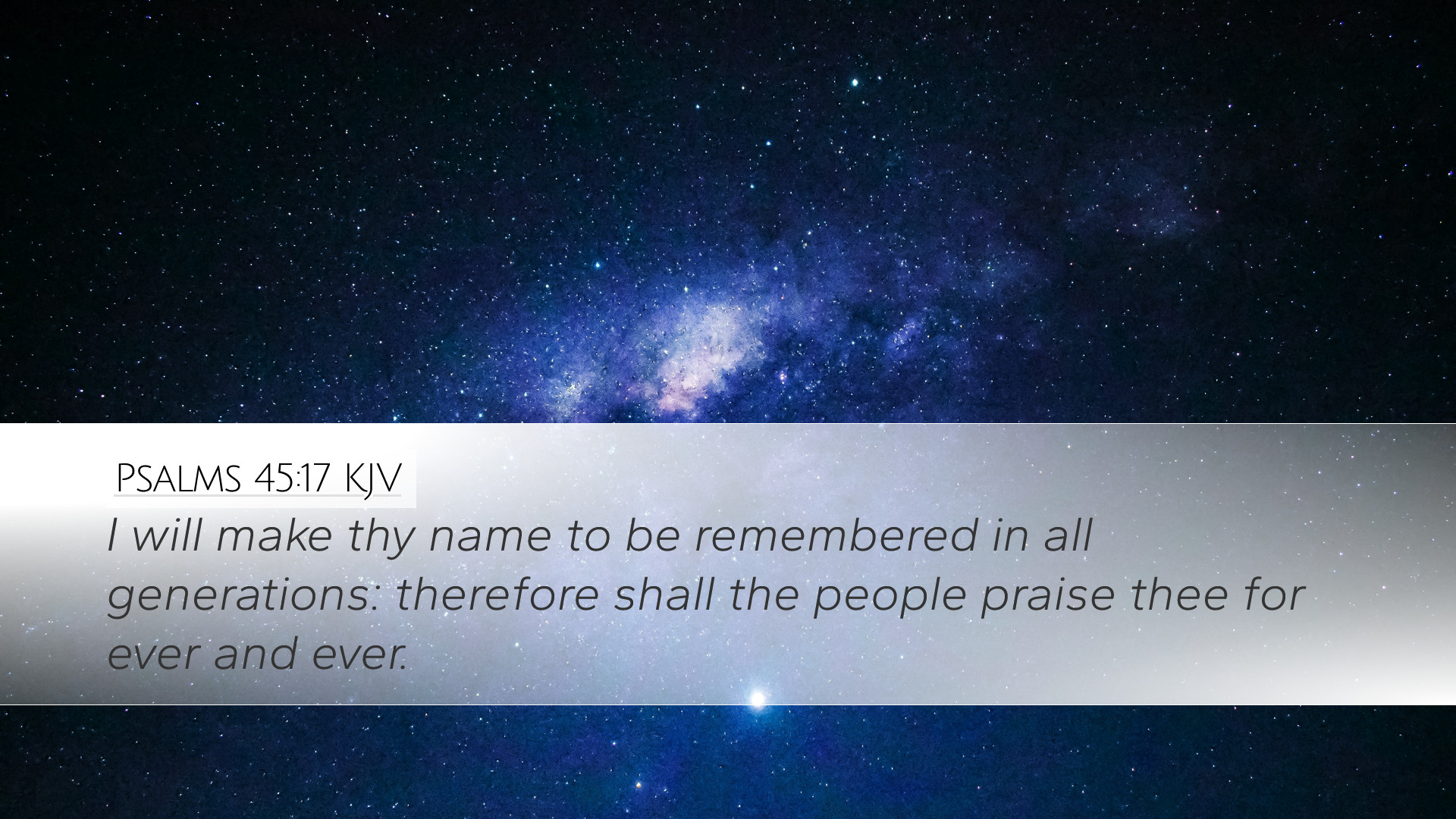Psalms 45:17 Commentary
Verse: "I will make thy name to be remembered in all generations: therefore shall the people praise thee for ever and ever."
Introduction
This verse encapsulates the themes of remembrance and eternal praise central to God's relationship with His people. The writer expresses a divine promise concerning the enduring legacy of God's name, which would be a source of constant remembrance and adoration among generations to come.
Contextual Analysis
This psalm is often attributed to the coronation of a king, celebrating royal majesty and the institution of the monarchy under God's providence. In this light, verses such as Psalms 45:17 serve not only as poetic expressions but also as proclamations of God's intentions towards His anointed leaders.
Insights from Matthew Henry
Matthew Henry emphasizes the affirmations of the psalmist regarding God's commitment to make His name known through the kingship of David and the ultimate fulfillment in Christ. He notes that the promise of "thy name to be remembered" signifies the enduring impact of God's righteousness and covenant on His people. This verse highlights the importance of legacy in leadership and the responsibility of leaders to promote the glorification of God's name through their reigns.
- The Legacy of Divine Names: Henry speaks to the significance of God's name as synonymous with His character and mission.
- Generational Influence: The theme of remembrance underscores the responsibility of one generation to pass on the truth of God to the next.
- Praise through Remembrance: Henry points out that the act of remembering leads to worship; as people recognize God's deeds through history, they are spurred to praise.
Reflections from Albert Barnes
Albert Barnes provides a theological perspective on the nature of God’s covenantal promise that is revealed in this verse. He interprets "I will make thy name to be remembered" as a declaration pointing to the everlasting nature of God’s presence and His governance over creation.
- Covenantal Faithfulness: Barnes insists that God's promise to allow His name to be remembered stems from His abiding faithfulness to Israel.
- Continuity of Praise: He expresses that this promise extends into eternity, bridging the connection between past and future generations in their worship of the Almighty.
- Application to the New Covenant: Barnes correlates this verse with the advent of Christ, reminding readers of the ultimate fulfillment of God’s promises through the Messiah who ensures the remembrance and worship of God perpetually.
Contributions from Adam Clarke
Adam Clarke offers a detailed analysis of the historical and spiritual implications of this verse. His commentary notes that the psalmist's affirmation serves as both a prophecy and a declaration of hope for future generations.
- Prospects of Glory: Clarke states that the remembrance of God's name brings forth hope and expectation of glory, which allows God’s people to dwell in assurance of His faithfulness.
- The Instrument of Praise: He points out that the act of praising God comes as a natural response to acknowledging His greatness and sovereign acts.
- Spiritual Legacy: Clarke emphasizes the importance of instilling reverence for God's name among children and the call to preserve His memory through teaching and worship practices.
Theological Implications
This verse has profound implications not just for Israel during the time of the psalmist, but for all of humanity. It reflects the theological concept of the eternal nature of God and the everlasting impact of His name. Consequently, Christians draw on this promise, understanding that the power of His name transcends time, indicating that God’s essence influences every believer's life.
- The Name of God: A Central Theme: The name of God in biblical theology often symbolizes His character, authority, and the relationship He desires with His people.
- Eternal Worship: The promise that people shall praise God "for ever and ever" is foundational to eschatological views, setting the groundwork for understanding praise as a continual act that both honors God and defines the believer’s existence.
- Responsibility of Witness: There lies a call for the church to bear witness to God’s name and His greatness, enduring through centuries to inspire praise in a world increasingly indifferent to His glory.
Conclusion
Psalms 45:17 serves as a profound reminder of God's sovereign initiative in establishing His name and honor through generations. It calls upon leaders to uphold the glorification of His name, blessing future generations with the knowledge and love of God. In our modern context, believers are tasked with upholding this legacy of praise, ensuring that God's name is remembered, revered, and glorified both now and in the years to come.


